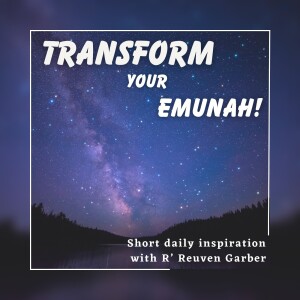
Thursday Feb 27, 2025
273 - Gratitude (Part-2)
We've discussed that the Torah commentaries outline that there are many chambers in the heavenly realms and sometimes a specific prayer can only make its way up if certain criteria are met, perhaps related to our righteousness, to our commitment and performance of the mitzvahs, to how sincere we were in verbalizing that prayer and many other factors. We've also discussed that Torah authorities outline to us that there is one chamber in the heavenly realms where no angels have any jurisdiction, the chamber of our prayers of gratitude. And that being the case, even when our merits do not dictate for our prayer to be answered, Hashem overlooks the situations many times, bringing about what we have desired, even when we shouldn't have deserved so.
The potency and power of thanking Hashem and the responsibility and opportunity for each one of us to do so is portrayed to us in the laws of davening. There are three prescribed prayers and the main part of the prayer is where everybody stands and prays the prescribed prayer quietly. After the quiet Shemona Esrei, the leader of the davening repeats the Shemona Esrei for the basic reason that if somebody does not know how to pray, this prayer can now be counted for all the individuals who do not know how to pray as if they prayed themselves. This law was much more relevant in times of old where used to pray without any siddurim and it was common for people to come to a synagogue and not know how to pray. However, even though we do have siddurim today, this law nevertheless still stands for various reasons.
It is worthwhile to point out that although one is able to fulfill their obligation of prayer by listening to the words and recitation of the Chazan, nevertheless, when we reach the paragraph of Modim which deals with thanking Hashem for the many blessings that He has given us, there there is a special paragraph that we all have to recite ourselves and commentaries explain because although all prayers are important but in a sense the most important prayer is the prayer of thank you and therefore when we reach the section of thank you in the repetition of the Shemona Esrei, it does not suffice for us to just hear the words of the Chazan and fulfill our obligation in that way; rather, we need to verbalize the thank you in our own words every single one of us. The gift of saying thank you to Hashem is available to every single one of us at every opportunity. Thank you Hashem for the privilege of waking up to another day and all the opportunities that you have presented me in my life.
"Thank you Hashem for the incredible opportunity to recite brachos today over everything I'm going to eat and drink and every time I use the bathroom. Thank you Hashem for the ability to go to the bathroom without pain so many times. Thank you my loving Father for the opportunity to be learning Torah, to be trying to and to have a personal relationship with you. Thank you Hashem for giving me a mouth and teaching me how to talk and giving me the opportunity to pray to you about anything and everything I might need and in particular thank you Hashem for the opportunity to thank you for all the gifts that you bestow on me in so many different ways. Thank you Hashem for all the gifts that you have given me."
No comments yet. Be the first to say something!